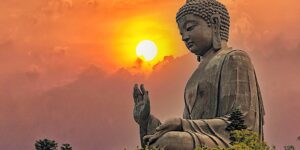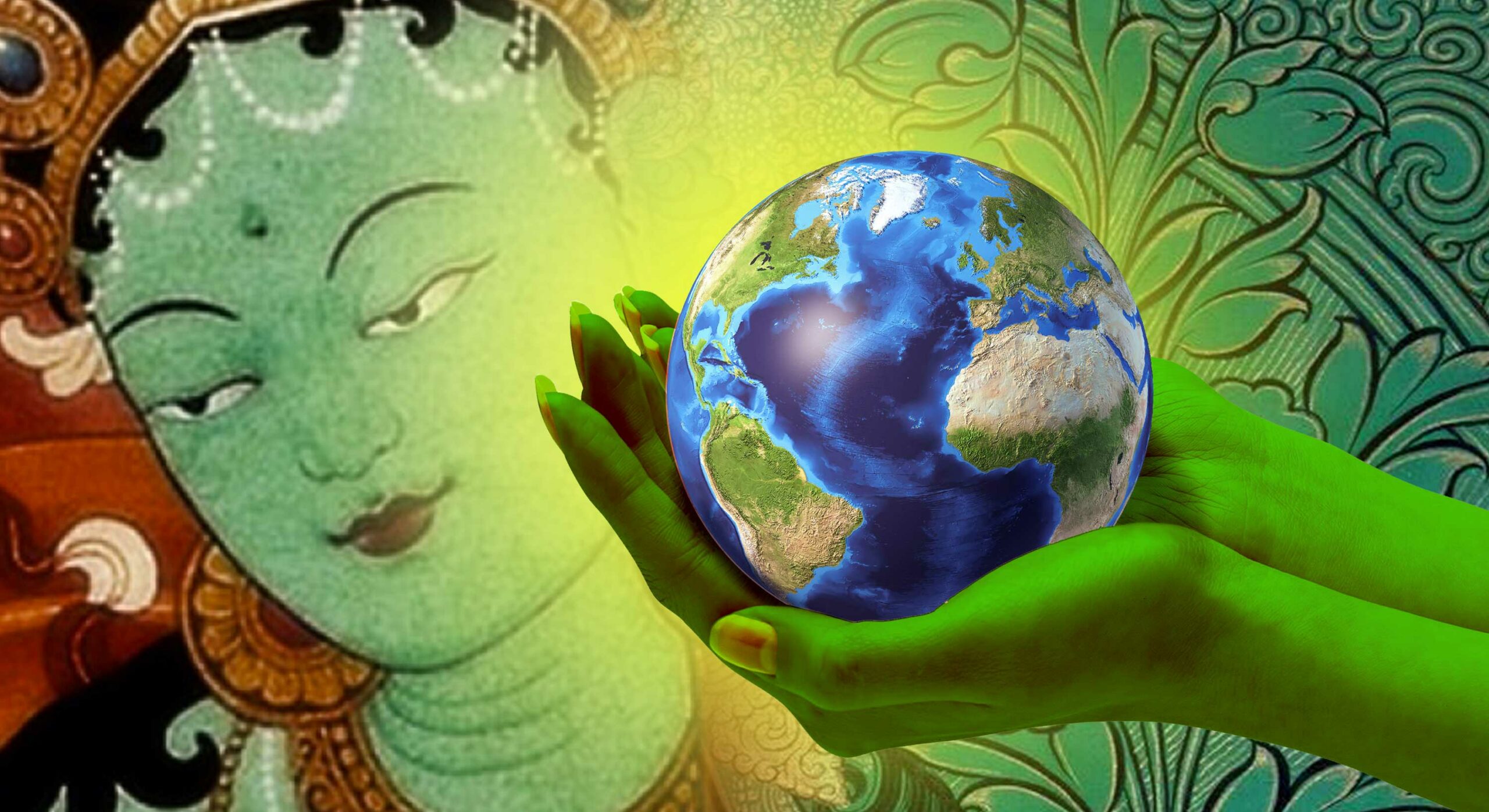Avalokiteshvara Guanyin Pusa Universal Gate Sutra 妙法蓮華經觀世音菩薩普門品 Recited for Benefit of all Beings
On Special days, such as Guanyin Pusa Avalokiteshvara’s birthday (Marchw 29, 2024, 19th of 2nd lunar month), merit from recitation of Guanshiyin’s sutra, Universal Gate Sutra is multiplied millions of times, extinguishing negative karma. This beautiful recitation is less than 12 minutes. On sacred days, ideally, chant three times and before bed, and on any other day when you need purification, reassurance or the virtue of meritorious sutra recitation.
TO RECITE ALONG: Turn on CC. We also have translations, choose your language. ALSO see transcript of Sutra below.
Video:
This special Sutra, the Lotus Sutra Avalokiteshvara Universal Gate 妙法蓮華經觀世音菩薩普門品 Chapter is important, explaining how Compassion is not limited to a single form, a single sex, or a single concept, but may arise in all spiritual traditions, in all forms of sentient beings, however is best to help suffering beings.
Recited here in English, you can use the Sanskrit name, as we have — Avalokiteshvara अवलोकितस्वर— or any of the translated names, such as Guan Yin 观世音, 觀世音, Guanshiyin Pusa, KuanYin, Chenrezig སྤྱན་རས་གཟིགས, Kannon, Gwaneum 관음, ကွမ်ယင်, อวโลกิเตศวร — and you can also say “He” or “She” with complete confidence. As stated in this very Sutra, She or He appears in countless forms, by countless names, and as both male and female. The face of compassion has no limits. It is for this reason, teachers often say, “all Bodhisattvas arise from Avalokiteshvara.”
This Sutra also explains how the practice of Homage to Avalokiteshvara Bodhisattva or Namo Avalokiteshvara Bodhisattvaya or Namo Guan Shi Yin Pusa is all we need, together with faith, if we need rescue or help from the boundless Bodhisattva of Compassion.
This Sutra is recited as a sacred, purifying and empowering practice on any day. Its merit and purifying benefits are multiplied infinitely on Guan Yin Avalokiteshvara’s three sacred days:
- March 29 2024 Guan Yin’s Birthday! (19th day of the 2nd lunar month)
- Guan Yin’s Enlightenment Day is July 25, 2024 (on the lunar calendar, the 19th day of the 6th Lunar Month, Lunar June).
- November 19 2024 will be Guan Yin’s Renunciation Day (19th day of the 9th lunar month)
For more about these special days, and other practices for these days, see our full written feature on Buddha Weekly: https://buddhaweekly.com/?p=13924
The Universal Gate Sutra is both a stand-alone Sutra and is also known as Chapter 25, the Universal Gate Chapter of the Lotus Sutra.
NOTE: For chanting Namo Avalokiteshvara Bodhisattva we usually add the suffix “ya” For example, if we say “Namo Buddha” it means (more or less) Homage The Buddha. Instead, we chant Namo Buddhaya, and it becomes more “grammatically” correct (in Sanskrit and Pali both): Homage TO the Buddha. Likewise here, if you chant Namo Avalokiteshvara Bodhisattva, it’s more or less correct (so don’t worry if you’ve been doing that), but it means strictly “Homage Avaokiteshvara Bodhisattva” whereas when we chant the more traditional “Namo Avalokiteshvara Bodhisattvaya” it more correctly means “Homage TO Avalokiteshvara Bodhisattva.” (CAPS for emphasis only.)
So, ideally, for a chant or refuge, you’d chant “Namo Avalokiteshvara Bodhisattvaya” if you are doing Sanskrit (for more correct grammar) or “Homage to Avalokiteshvara Bodhisattva” if you’re are doing English (with “to” in English, no need for the “ya”) and “Namo Guan Shin Yin Pusa” if you are doing Chinese, etc. “Ya” at the end of Sanskrit just makes it more “correct” and adds the qualifying “to.”
This is why the refuge chant many of us do each morning is: Namo Buddhaya, Namo Dharmaya, Namo Sanghaya (instead of Namo Buddha). This means “Homage to the Buddha, Homage to the Dharma, Homage to the Sangha.” Without the “ya” it becomes, more or less abbreviated (but somewhat okay): Homage Buddha, Homage Dharma, Homage Sangha. The “to” makes it more explicitly clear we are taking refuge.
Likewise, Namo Avalokiteshvara Bodhisattvaya makes it clear we take refuge in the Great Bodhisattva of Compassion. If you abbreviate it, you might say Namo Avalokiteshvaraya (i.e. if you didn’t use the title Bodhisattva, the ya is suffixed to Avalokiteshara in the same way we take refuge with Namo Buddhaya.) This makes it, more or less Homage to Avalokiteshvara instead of Homage Avalokiteshvara.
Either way, the main aspect is calling out the “name” of the Bodhisattva and taking refuge in his compassionate activity and power.
FULL SUTRA TRANSCRIPT
AT THAT TIME Akshayamati rose from his seat, uncovered his right shoulder, placed his palms together, and facing the Buddha, said, “World Honored One, for what reason is the Bodhisattva Avalokiteshvara called ‘Avalokiteshvara’?”
The Buddha told Akshayamati; “Good son, if any of the limitless myriads of innumerable living beings who are undergoing all kinds of suffering hear of Avalokiteshvara Bodhisattva, and recite his name single-mindedly, Avalokiteshvara Bodhisattva will immediately hear their voices and rescue them.
“If a person who upholds the name of Avalokiteshvara Bodhisattva is in danger from a great fire, the fire will not burn him, all because of this Bodhisattva’s awesome spiritual power.
“If a person being tossed about in the great flood calls out the Bodhisattva’s name, he will find a shallow place.
“If a person ventures on the great sea, an evil wind may toss their boats. But if among them there is even one person who calls out the name of Avalokiteshvara Bodhisattva, they will all be saved from storms and dangers. For this reason, he is called Avalokiteshvara.
“Further, if a person who is attacked calls out the name of Avalokiteshvara Bodhisattva, not even a hair will be harmed.
“If demons and monsters torment a person, if they hear him call out the name of Avalokiteshvara Bodhisattva, all those evil ghosts will not even be able to stare at that person with their evil eyes, how much the less harm him.
“If a person, whether guilty or not, who has been imprisoned calls out the name of Avalokiteshvara Bodhisattva, he will be freed.
“If bandits infest a dangerous road on which a group of merchants travel, but among the merchants there is even a single person who says, ‘Good men, do not be afraid!
You should all single-mindedly recite the name of Avalokiteshvara Bodhisattva. This Bodhisattva bestows fearlessness upon living beings. If you recite his name, you shall surely be saved from these robbers,’
And, if upon hearing that, the merchants all cry out together, ‘Namo Avalokiteshvara Bodhisattva,’ then they will immediately be saved because they recited his name.
“Akshayamati, the awesome spiritual power of the Bodhisattva Mahasattva Avalokiteshvara is as lofty and sublime as that!
“If living beings who have inappropriate desires constantly and reverently recite the name of Avalokiteshvara Bodhisattva, they will be separated from desire.
“If those who have much hatred constantly and reverently recite the name of Avalokiteshvara Bodhisattva, they will be separated from hatred.
“If those who are deluded or foolish constantly and reverently recite the name of Avalokiteshvara Bodhisattva, they will be separated from delusion and foolishness.
“Avalokiteshvara Bodhisattva has great awesome spiritual powers such as these and confers great benefits. Therefore living beings should always be mindful of him.
“If parents seek children, if they prostrate and make offerings to Avalokiteshvara, they will give birth to blessed, virtuous, and wise children who have planted roots of virtue in previous lives and who are regarded and respected by all.
“Avalokiteshvara Bodhisattva has powers such as these. If there are living beings who reverently bow to Avalokiteshvara Bodhisattva, they will be blessed and their efforts will not be in vain.
“Therefore living beings should all receive and uphold the name of Avalokiteshvara Bodhisattva.
“Akshayamati, if a person were to receive and uphold the names of innumerable Bodhisattvas, and in addition were, throughout their lives, to make offerings to them of food, drink, clothing, bedding, and medicine, what do you think—would that good person’s merit and virtue be great or not?”
Akshayamati replied, “Very great, World Honored One.”
The Buddha said, “If another person were to receive and uphold the name of Avalokiteshvara Bodhisattva and bow and make offerings but once, that person’s blessings would be equal to and not different from the other person’s.
The merit could not be exhausted in hundreds of thousands of myriads of eons.
“Akshayamati, one who receives and upholds the name of Avalokiteshvara Bodhisattva obtains the benefit of blessings and virtues as limitless and boundless as those.”
Akshayamati said to the Buddha, “World Honored One, how does Avalokiteshvara Bodhisattva manifest in this world? How does he speak the Dharma for living beings? How does he carry out this work with skillful means?”
The Buddha told Akshayamati, “Good son, if living beings in any world must be saved by means of someone in the body of a Buddha, Avalokiteshvara Bodhisattva will manifest in the body of a Buddha and speak Dharma for them.
“If they must be saved by someone in the body of a Pratyekabuddha, he will manifest in the body of a Pratyekabuddha and speak Dharma for them.
“If they must be saved by someone in the body of a Shravaka or Disciple, he will manifest in the body of a Shravaka or Disciple and speak Dharma for them.
“If they must be saved by someone in the body of a god, he will manifest in the body of a god and speak Dharma for them.
“If they must be saved by someone in the body of a great heavenly general, he will manifest in the body of a great heavenly general and speak Dharma for them.
“If they must be saved by someone in the body of a king, he will manifest in the body of a king and speak Dharma for them.
“If they must be saved by someone in the body of an Elder, he will manifest in the body of an Elder and speak Dharma for them.
“If they must be saved by someone in the body of a layman, he will manifest in the body of a layman and speak Dharma for them.
“If they must be saved by someone in the body of a minister of state, he will manifest in the body of a minister of state and speak Dharma for them.
“If they must be saved by someone in the body of a monk or nun, he will manifest in the body of a monk or nun and speak Dharma for them.
“If they must be saved by someone in the body of a heavenly dragon, yaksha, gandharva, asura, garuda, kinnara, mahoraga, human, or nonhuman, and so forth, he will manifest in such a body and speak Dharma for them.
“If they must be saved by someone in the body of a Vajra-wielding spirit, he will manifest in the body of a Vajra-wielding spirit and speak Dharma for them.
“Avalokiteshvara Bodhisattva has accomplished merit and virtue such as this and, in all manner of forms, manifesting throughout the countless world systems, saving and liberating living beings.
“Therefore you should all single-mindedly make offerings to Avalokiteshvara Bodhisattva. Avalokiteshvara Bodhisattva Mahasattva can, in the midst of fear, crisis, and hardship, bestow fearlessness.
Akshayamati said to the Buddha, “World Honored One, I shall now make an offering to Avalokiteshvara Bodhisattva.”
He then removed his necklace of pearls, its value in the hundreds of thousands of ounces of gold, and offered it to the Bodhisattva, saying, “Benevolent One, accept this Dharma offering, this necklace of precious pearls.”
Avalokiteshvara Bodhisattva refused to accept it.
Akshayamati again said to Avalokiteshvara Bodhisattva, “Compassionate One, out of pity for us, accept this necklace.”
The Buddha then said to Avalokiteshvara Bodhisattva, “You should take pity on Akshayamati and the fourfold assembly, as well as the gods, dragons, yakshas, gandharvas, asuras, garudas, kinnaras, mahoragas, humans, nonhumans, and so forth, and accept this necklace.”
Then, out of pity for the fourfold assembly, the gods, dragons, humans, nonhumans, and so forth, Avalokiteshvara Bodhisattva accepted the necklace. He divided it into two parts: one part he offered to Shakyamuni Buddha and the other to the stupa of Many Jewels Buddha.
Such is the self-mastery and spiritual power of Avalokiteshvara Bodhisattva, who roams throughout the suffering worlds “
At that time Ksitigarbha Bodhisattva Guardian of the Earth rose from his seat and said to the Buddha, “World Honored One. If there are those who hear this chapter of Avalokiteshvara Bodhisattva, who learn about the self-mastery of his deeds and the power of his spiritual penetrations as shown in this Universal Door, you should know that the merit and virtue of such people will not be small.”
Here ends the Universal Gate Chapter of the Lotus Sutra. May all beings benefit.
#namoavalokiteshvaraya #namoavalokiteshvara #namoguanshiyinpusa #namoavalokiteshvarabodhisattva
Latest Features
Please support the "Spread the Dharma" mission as one of our heroic Dharma Supporting Members, or with a one-time donation.
Please Help Support the “Spread the Dharma” Mission!

Be a part of the noble mission as a supporting member or a patron, or a volunteer contributor of content.
The power of Dharma to help sentient beings, in part, lies in ensuring access to Buddha’s precious Dharma — the mission of Buddha Weekly. We can’t do it without you!
A non-profit association since 2007, Buddha Weekly published many feature articles, videos, and, podcasts. Please consider supporting the mission to preserve and “Spread the Dharma." Your support as either a patron or a supporting member helps defray the high costs of producing quality Dharma content. Thank you! Learn more here, or become one of our super karma heroes on Patreon.
Lee Kane
Author | Buddha Weekly
Lee Kane is the editor of Buddha Weekly, since 2007. His main focuses as a writer are mindfulness techniques, meditation, Dharma and Sutra commentaries, Buddhist practices, international perspectives and traditions, Vajrayana, Mahayana, Zen. He also covers various events.
Lee also contributes as a writer to various other online magazines and blogs.










